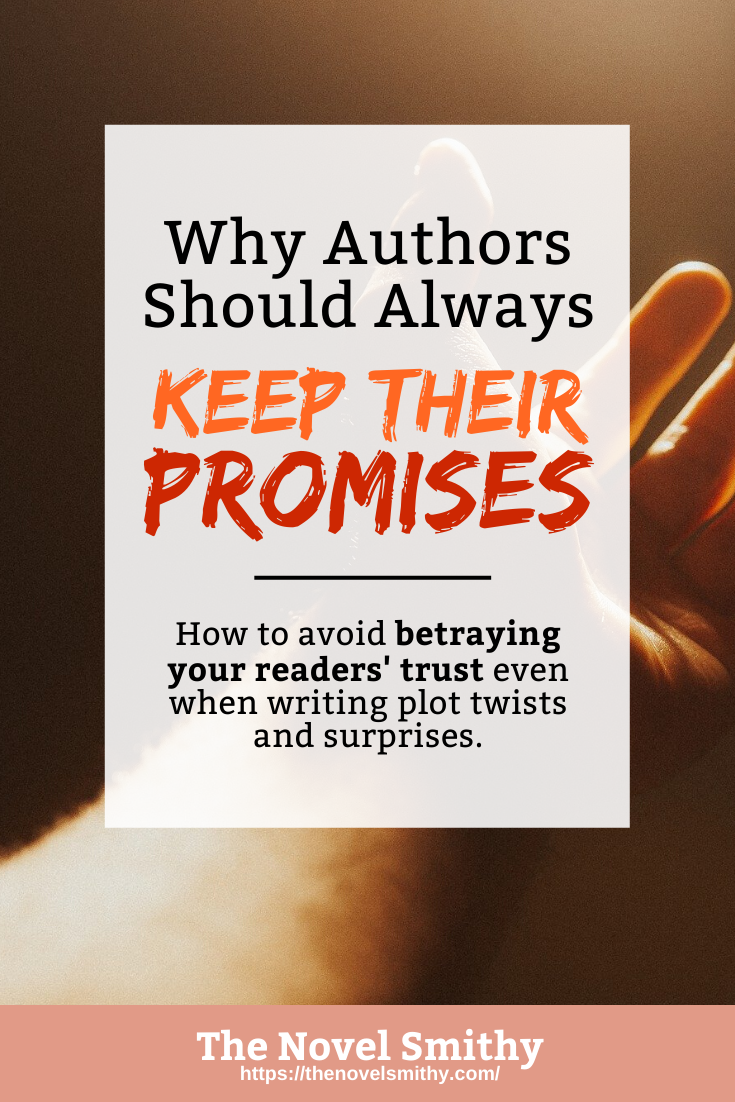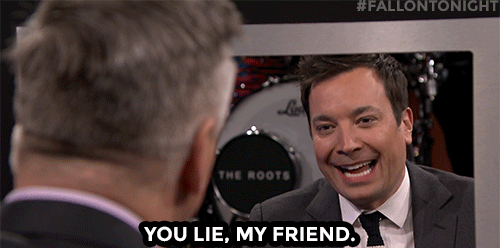Why Authors Should Always Keep Their Promises
Honesty is a quality revered in almost every society.
Not only does it let us function as friends and neighbors, but it acts as the foundation from which we build all of our relationships. In fact, while you might not think of it immediately, the relationship between authors and their readers is no different: honesty is king.
Why is it then that so many authors fail to keep their promises to their readers? Whether it’s foreshadowing that goes nowhere or plot threads that never come to fruition, it seems far too many authors don’t understand the critical importance of keeping their promises.
What Do I Mean by an Author’s Promise?
Contents
 At first glance, you may think I’m saying that authors purposefully lie to their readers about things like release dates, or character reveals, but that’s not the case. Instead, when an author lies to their reader…
At first glance, you may think I’m saying that authors purposefully lie to their readers about things like release dates, or character reveals, but that’s not the case. Instead, when an author lies to their reader…
They do so by setting up an event in their story and then failing to deliver.
This could take a whole variety of forms, from unrealized character arcs to flat Climaxes or hollow Resolutions. However, it’s not as simple as just writing a bad or unsatisfactory story.
Instead, as you write your novel you make promises to your reader about what they’re about to experience. You set the tone of your story, and you lay the groundwork for plot threads, events, twists, and turns that your reader naturally picks up on.
Unfortunately, if you fail to deliver on that setup your readers will feel lied to, whether consciously or subconsciously. While surprising readers can be a wonderful thing, we should never betray the promises we set up. Instead of saying “where did that come from,” we want our readers to say:
“I can’t believe I didn’t see that coming!”
Of course, it would help to know the ways we as authors make promises to our readers, so we can make sure we’re keeping those promises and not betraying them on accident.
5 Ways Authors Make Promises to Their Readers
The Hook:
Nearly every professional editor has dealt with the infamous opening dream sequence, and all of them have left a similar comment: “Don’t begin your novel with a dream.”
However, the problem isn’t the dream sequence itself—it’s what comes after it.
Instead of being related to the plot, these dream sequences are usually just meant as a cool action sequence to hook the reader, even though they aren’t relevant to the rest of the story. Many prologues have similar problems, with the result being tons of blanket states about how no stories should have prologues.
In reality, the real problem here isn’t the dream sequence or the prologue itself, but the fact that the novel’s Hook is lying to the reader. Your Hook is the first thing your reader experiences in your story, and it provides an important window into what the rest of your story will be about. Because of this, you should always write a Hook that ties into your larger novel in some way, thus making a promise to your reader you know you can keep.
The Dramatic Question:
If you’re unfamiliar with this term, your novel’s Dramatic Question is the question your reader will ask throughout your novel. This sums up the core conflict of your entire adventure.
For example:
- Will Frodo get the ring to Mordor?
- Will Katniss survive the Hunger Games?
- Will Luke defeat the Death Star?
- Will Moana restore Te Fiti’s heart?
Your Dramatic Question is important for a variety of reasons, and is a vital for creating a true page-turner. However, it also makes a promise to your reader. Think about it this way: If your reader spends your novel asking “Will Luke defeat the Death Star,” but the question you answer by the end is “Will Luke defeat Chewbacca in a game of Dejarik,” they’ll feel pretty burned.

By the time your reader is a quarter of the way through your novel, they should have a clear idea of what your novel’s core conflict is and should have your Dramatic Question front and center in their minds. Then, before your novel ends, this question should be answered and the conflict you set up at the beginning should come to its conclusion.
Otherwise, it’s time to reevaluate what story you really want to write.
Foreshadowing:
Most of us are at least somewhat familiar with Chekov’s Gun:
“One must never place a loaded rifle on the stage if it isn’t going to go off. It’s wrong to make promises you don’t mean to keep.” – Anton Chekov, in a letter to Aleksandr Lazarev
At its core, what he’s saying boils down to this: if you foreshadow something early in your novel, you must bring that foreshadowing to fruition by the end.
Much like the importance of answering your Dramatic Question, making sure your foreshadowing pays off is key if you want to keep your readers happy. The most intriguing stories are the ones where readers can go back and re-experience the adventure, picking up on all the foreshadowing they missed the first time, not the ones where sudden plot twists come out of nowhere.
Not only does this make the eventual payoff more impactful, but it prevents your story from feeling disjointed or aimless. If you foreshadow something early in your novel, keep your promise—make sure the rifle goes off by the end.
Your Character Arcs:
Your characters’ arcs will function similarly to your foreshadowing.
You see, when you set up a character as flawed and begin their character arc you’re promising your reader that they will change in some way by the end of that arc. Whether it’s a positive or a negative character arc, they should never end in the same place they began, and they should undergo some level of transformation or growth.
The only real exception to this rule is flat arc characters.
Instead of experiencing significant change themselves, they’ll see the world around them change thanks to their influence. However, you should still make sure their world actually, meaningfully changes—again, either positively or negatively.
Your Novel’s Tone:
Finally, we come to the last promise authors make to their readers: tone
When your reader picks up your novel, they’re immediately greeted by the tone of your story. This is made up of the language you use, the way you structure your prose, as well as how you describe the settings and events of your story.
For example, if you start out with a dark and brooding tone, you don’t want to pivot and reveal that your novel is actually a lighthearted romantic comedy. Your reader stuck around beyond your first few pages because they liked the tone of your story and were interested in what it had to offer—don’t betray them by suddenly shifting to a different story that in no way matches the tone you started with.
Why Readers Expect Honesty
With all this talk of lying and betrayal, you may think I have a very negative view of most authors, but that isn’t the case—I don’t think any author betrays their promises out of malice. In fact, I imagine very few authors sit down at their desks, twirl their evil mustaches and think:
“Ah yes, I’m going to lie to my readers today!”
No, instead it seems to be a case of misunderstanding—authors either don’t realize they’re making a promise, or forget that that promise needs to be paid off before their story is through.
Some authors lie because they’re trying to surprise their readers, not realizing there’s a fine line between an interesting plot twist and poorly foreshadowed misdirection. Others are too scared to pay off the darker plot threads they set up early in their novel, understandably shying away from violent, sad, or depressing scenes—but without changing the beginning of their story to compensate. Finally, there are a handful of authors who don’t know their own story well enough to see the promises they’re making to their readers.

In all of these cases there’s no malice involved, but that doesn’t mean the effects of lying to your readers are any less damaging. Not only will your readers put down your book for good, but they’ll often steer others away from your novel as well.
This is because, when readers begin a new novel, they go in with certain expectations about what they’ll find. If they read your first few pages and realize your book isn’t for them, they’ll simply put it down—no harm, no foul. However, if they do keep reading, they do so because you’ve made a promise:
“I think you’ll enjoy my story, and here’s why.”
When you never pay off that all important “why,” you’ve betrayed your reader’s trust, and you can bet that reader will never return to your novels. There’s nothing quite like a reader scorned, after all, and we’ve all seen the Amazon reviews to prove it.
There’s nothing like a reader scorned, and we’ve all seen the Amazon reviews to prove it. Share on X
The Failed Promises of Star Wars: The Rise of Skywalker
While I know this will be controversial to some, I have a high profile example of the importance of keeping your promises as an author:
The Rise of Skywalker.
Regardless of your feelings on the last three Star Wars movies, The Rise of Skywalker does a lot of things right, and it’s certainly worthy of praise for how it turned this latest trilogy around. Yet, since watching it back in December, I’ve been unable to ignore how this movie betrayed nearly every promise it set up (which turned into the original inspiration for this article).

To a large degree, this seems to be a reaction to the debacle that was The Last Jedi—the writers were scared of shaking up the Star Wars’ canon any further, but still wanted to surprise and shock their audience. This means the movie constantly foreshadowed interesting plot twists, only to back down when they got too intense.
For example:
- Rey has no parents… except she does, and they loved her very much.
- Rey is at risk of turning to the Dark Side… except she doesn’t, though we never see her overcome anything significant enough to make that a convincing transformation.
- Rey kills Chewbacca as a part of being pulled in by the Dark Side… except she doesn’t, and the movie shows us he’s fine within five minutes of saying he’s dead.
- Rey feels responsible for C3PO’s memories being reset… except he’s fine too, and this is brushed aside a few scenes later.
- And many, many more…
So many of these broken promises had to do with Rey and her character arc, and it makes it seem like the writers really weren’t sure what to do with her. There were so many interesting developments foreshadowed—primarily Rey being sucked in by the Dark Side and either fighting to redeem herself or being defeated by Kylo Ren as a part of his own redemption arc—but not a single one payed off.

In the end, I get the feeling the writers were afraid of making the audience uncomfortable. Yet, they also didn’t want to remove the interesting foreshadowing that set up those ideas, demanding they have it both ways. As a result, the movie became a string of broken promises—interesting at the start, but meaningless by the end.
How to Keep Your Promises as an Author
What all of this boils down to is a simple fact: authors should always keep their promises.
Whether that means following through on your story’s foreshadowing or keeping your tone consistent with the story you’re trying to tell, you should always pay attention to the promises you’re making to your readers. After all, if you fail to keep those promises, you rob your novel of its impact and your readers of a satisfying adventure. It isn’t edgy or unpredictable to trick your reader—it’s just bad writing.
Here are some final tips for keeping your promises as an author:
#1: If you’re planning a plot twist, foreshadow it beforehand. Readers should think “I can’t believe I didn’t see that coming,” not “where did that come from?”
#2: Keep your novel’s tone consistent. If you don’t, you’ll end up missing out on readers who would enjoy your story while angering those who got the wrong message.
#3: Don’t set up a plot you aren’t comfortable following through on. If things are getting too intense for your liking, consider how you got to that point and correct course earlier in your novel.
#4: Study story structure and character development. These exist for a reason, and provide excellent guidelines for when elements of your story should pay off.
Above all, pay attention to the promises you’re making! You and I both know you’re trustworthy, so it’s time to prove that to your readers as well. 🙂


Very helpful reminders in this post, thanks. What are your thoughts on “pregnant blanks,” ideas you drop in the background to provide intrigue and wonder, but never really explain. Are these broken promises?
Hi Bennett!
I would say those kinds of worldbuilding can work, with a few caveats. For one, they shouldn’t be critical to the reader’s understanding of your story—if they’re just there to add some depth to your world, that’s fine.
Additionally, I would argue there’s a difference between leaving some things to the reader’s imagination, and tricking them like I describe in the post. If you set up an idea only to make a complete 180 later, readers will probably feel pretty burnt. On the other hand, leaving some ideas open-ended would hopefully encourage their curiosity! 🙂
I actually wrote a guest post over at Just Writerly Things about this topic. It might be worth checking out: https://www.justwriterlythings.com/blog/how-to-preserve-the-magic-of-your-story/